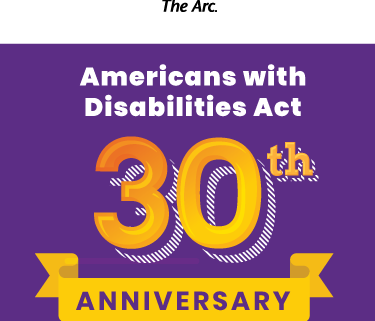The Arc Commemorates and Reflects on the 30th Anniversary of the ADA
This Sunday, July 26th, we celebrate the 30th anniversary of the Americans with Disabilities Act (ADA). The Arc is proud of our role in protecting the rights of people with disabilities, including as a significant player in the passage of the ADA. Consistent with our work for decades on policy development and legal efforts on key issues including deinstitutionalization, transforming state service systems, and ensuring that people with I/DD have access to education and life in the community, The Arc was committed to advancing the bill creating a national mandate for the elimination of discrimination on the basis of disability. From educating Congress and the public on the discrimination faced by people with disabilities and their families, helping to organize the grassroots, and supporting Congressional hearings and promotion on the Hill, The Arc was actively engaged in the fight for the ADA. State and local Chapters of the Arc were integral to the movement. Through the tenacious advocacy of The Arc with our allies across the disability community, the bill passed with broad bipartisan support.
The ADA transformed the country in important ways, changing expectations for the lives of people with disabilities. The law requires accessibility and bans discrimination in almost all private businesses, and has significantly reduced discrimination in state and local government services. The transportation and paratransit provisions have yielded greater mobility and community participation. Employment provisions have been important, for example, providing protections in the hiring process and expanding the use of job accommodations for workers with disabilities. The built environment has tangibly changed based on the requirements of the ADA, for example, ramped building entrances and curb cuts on sidewalks are now common. In major ways, people with disabilities are closer to the goals of equality of opportunity, full participation, independent living, and economic self-sufficiency defined in the law.
Thanks to the work of countless committed advocates, we have taken meaningful steps toward the elimination of discrimination against individuals with disabilities. We reflect with pride on the many ways the ADA has achieved its promise. However, even as we honor the powerful progress we have made, there is still much ground to cover. We must end inappropriate and unnecessary institutionalization and ensure sufficient long-term services and supports to accomplish the goal of the integration mandate; address low employment rates for people with disabilities; ensure fair and equal treatment in the voting process; and continue to work to eliminate the architectural, communication, transportation and other barriers and disparities that prevent people with disabilities from sharing in and contributing to the promise of this country.
As we observe the thirty-year landmark of the passage of the ADA, we face a global pandemic. COVID-19 has hit the disability community extremely hard. People with disabilities, particularly people with disabilities in congregate settings and the people who provide their services, are experiencing high rates of infection and death, and this impact is magnified in communities of Black and Brown people, Native Americans, and immigrant communities. In this era, we have utilized the ADA and other disability rights laws to oppose illegal disability discrimination in treatment rationing protocols being developed in response to COVID-19. But more must be invested into the home and community-based system so that people with disabilities can be safe and stay in their homes and communities. We continue to champion the #WeAreEssential campaign, because we must sustain the fight for the lives of people with disabilities and to dismantle the serious and still pervasive remnants of discrimination on the basis of disability.
We know that the intersection of disability with poverty and racism increases the prejudice and harm that many people experience. Right now, our nation is engaged in social justice and civil rights struggles to address systemic racism and violence. As we renew our commitment to the ADA, and the charge to eliminate unjustified segregation and exclusion of people with disabilities from American life, The Arc reaffirms our goal to protect against forms of discrimination based on disability, race, sex, gender identity and expression, sexual orientation, national origin, or any other protected status. We will keep fighting to defend the rights and lives of people with disabilities and their families, and advance toward full integration and inclusion for all.








